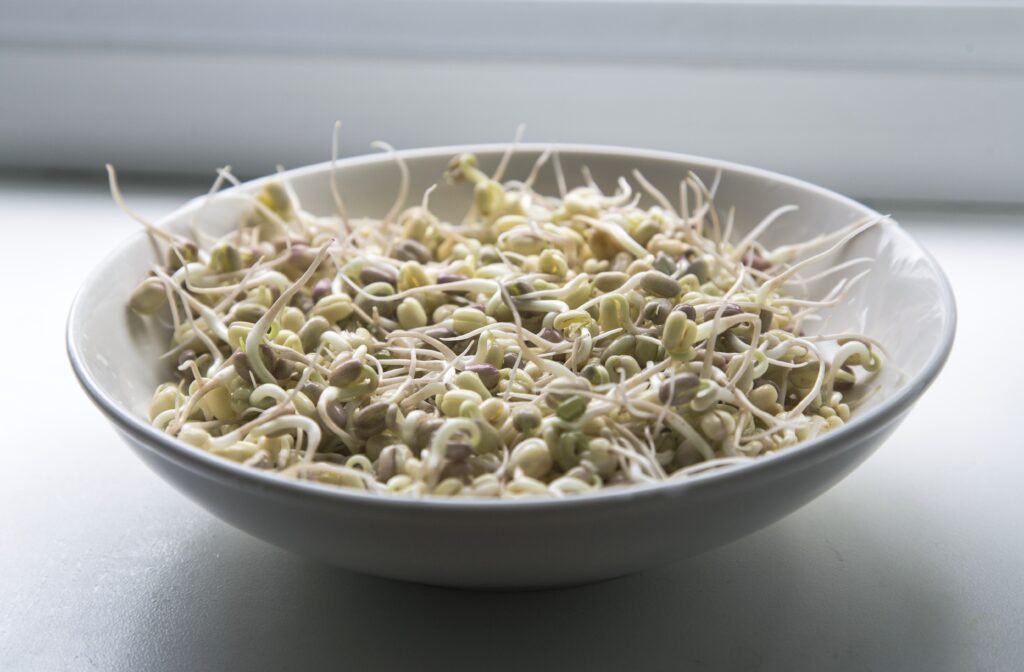Adding beans to your diet could be the key to longevity. According to a recent article by CNN, incorporating beans into your meals may increase your chances of reaching the impressive milestone of living to 100 years old. Authored by Sandee LaMotte, the article explores the potential health benefits of consuming beans and their association with longevity. So, if you’re looking to improve your overall health and increase your chances of a longer life, it may be time to start adding more beans to your plate.

Introduction
With the pursuit of a long and healthy life being a common goal for many individuals, it is important to consider the role of diet in promoting longevity. Among the various food choices available, beans have emerged as a key component of a longevity diet, offering numerous health benefits that contribute to overall well-being. This article will explore the link between diet and lifespan, highlighting the reasons why beans are an essential inclusion in a longevity-focused diet.
The Role of Diet in Longevity
The link between diet and lifespan
Research has consistently shown that diet plays a significant role in determining an individual’s lifespan. A well-balanced and nutritious diet can help prevent chronic diseases, maintain a healthy weight, and support overall health and well-being. Conversely, a poor diet can lead to increased risks of various health conditions, including heart disease, diabetes, and certain types of cancer. By making informed dietary choices, individuals can optimize their health and increase their chances of living a longer, healthier life.
Why beans are a key component of a longevity diet
Beans, often referred to as legumes, are a versatile and nutrient-dense food that can provide a multitude of health benefits. They are an excellent source of plant-based protein, fiber, and essential vitamins and minerals. Incorporating beans into a longevity-focused diet can contribute to maintaining a healthy weight, reducing the risk of chronic diseases such as heart disease and type 2 diabetes, and promoting digestive and overall health. The nutritional value of beans, combined with their versatility and accessibility, makes them an ideal choice for individuals looking to enhance their longevity through dietary modifications.

Nutritional Value of Beans
High protein content
Beans are an excellent source of plant-based protein, making them a valuable addition to a longevity diet. Protein is essential for the growth, repair, and maintenance of body tissues, as well as the production of enzymes and hormones. Unlike animal-based protein sources, beans offer the added benefit of being low in saturated fat and cholesterol. This makes them a healthier choice for individuals looking to reduce their intake of animal protein and make more sustainable dietary choices.
Rich in fiber
Fiber is an important nutrient that is often lacking in many modern diets. Beans are a rich source of both soluble and insoluble fiber, which can provide numerous health benefits. Soluble fiber helps to lower cholesterol levels, regulate blood sugar levels, and promote a healthy gut microbiome. Insoluble fiber, on the other hand, adds bulk to the stool, aids in digestion, and prevents constipation. By incorporating beans into the diet, individuals can ensure they are consuming an adequate amount of fiber, which is crucial for maintaining digestive health and preventing chronic diseases such as colon cancer and heart disease.
Loaded with essential vitamins and minerals
Beans are also packed with essential vitamins and minerals that support overall health and well-being. They are particularly rich in folate, iron, potassium, and magnesium. Folate is essential for DNA synthesis and cell division, making it important for overall growth and development. Iron is necessary for the production of red blood cells and the transportation of oxygen throughout the body. Potassium and magnesium play crucial roles in maintaining normal blood pressure, muscle function, and electrolyte balance. By including beans in the diet, individuals can ensure they are meeting their nutritional needs and promoting optimal health.
Low in fat and cholesterol
Beans are naturally low in fat and cholesterol, making them a heart-healthy food choice. High levels of saturated fat and cholesterol in the diet can increase the risk of heart disease and other cardiovascular conditions. By substituting beans for higher-fat and cholesterol-rich foods, individuals can lower their overall intake of these harmful substances. Additionally, the high fiber content of beans can further contribute to heart health by reducing cholesterol levels and promoting healthy blood pressure levels.
Beans and Heart Health
Reducing the risk of heart disease
Heart disease is a leading cause of death worldwide, and adopting a heart-healthy diet is crucial for its prevention. Beans have been shown to reduce the risk of heart disease due to their nutrient profile and beneficial effects on various risk factors. The high fiber content of beans helps to regulate cholesterol levels by reducing the absorption of dietary cholesterol in the intestines. Additionally, beans are low in saturated fat, which can further contribute to the maintenance of healthy cholesterol levels. By incorporating beans into the diet, individuals can significantly reduce their risk of developing heart disease and improve their cardiovascular health.
Lowering blood pressure levels
High blood pressure, or hypertension, is a common risk factor for heart disease and stroke. The potassium and magnesium content of beans plays a crucial role in regulating blood pressure levels. Potassium helps to relax blood vessel walls, promoting optimal blood flow and reducing the strain on the cardiovascular system. Magnesium, on the other hand, helps to relax smooth muscles, including those found in blood vessels. By consuming beans regularly, individuals can help lower their blood pressure levels and decrease the risk of developing hypertension.
Managing cholesterol levels
High cholesterol levels are a significant risk factor for heart disease. Beans, with their high fiber content, have been shown to decrease cholesterol levels, particularly low-density lipoprotein (LDL) cholesterol, which is commonly referred to as “bad” cholesterol. Soluble fiber binds to cholesterol in the intestines and prevents its absorption, allowing it to be excreted from the body. By incorporating beans into the diet, individuals can effectively manage their cholesterol levels and reduce their risk of heart disease.

Beans and Digestive Health
Improving digestion
Beans are an excellent source of dietary fiber, which is essential for maintaining a healthy digestive system. The soluble fiber found in beans adds bulk to the stool and helps to regulate bowel movements, preventing constipation and promoting regularity. Insoluble fiber, on the other hand, acts as a natural laxative and aids in the movement of food through the digestive tract. By including beans in the diet, individuals can support optimal digestion and prevent digestive disorders such as constipation and irritable bowel syndrome (IBS).
Preventing constipation
Constipation is a common problem characterized by infrequent bowel movements and difficulty passing stool. It can cause discomfort and negatively impact overall well-being. The high fiber content of beans helps to prevent constipation by adding bulk to the stool and promoting regular bowel movements. Additionally, beans contain compounds that stimulate the production of digestive enzymes, further aiding in the digestion process. By consuming beans regularly, individuals can improve their digestive health and prevent the development of constipation.
Promoting healthy gut bacteria
The gut microbiome, consisting of trillions of microorganisms, plays a crucial role in maintaining digestive health and overall well-being. Beans are a rich source of prebiotics, which are non-digestible fibers that provide nourishment to beneficial bacteria in the gut. By promoting the growth of these beneficial bacteria, beans can improve gut health, enhance nutrient absorption, and support immune function. The consumption of beans contributes to a healthy gut microbiome, which is essential for maintaining optimal digestion and overall health.
Beans and Weight Management
High fiber content keeps you feeling full
One of the key factors in maintaining a healthy weight is controlling appetite and managing food cravings. The high fiber content of beans can help individuals feel fuller for longer, thus reducing the likelihood of overeating and promoting satiety. Fiber absorbs water in the digestive tract, forming a gel-like substance that slows down digestion and prolongs the feeling of fullness. By including beans in meals or snacks, individuals can effectively manage their appetite and prevent overconsumption of calories.
Low calorie density aids in weight loss
When it comes to weight loss, the calorie density of food is an important consideration. Foods with a lower calorie density provide fewer calories per gram of food, allowing individuals to consume a larger volume of food for the same number of calories. Beans are low in calorie density, making them an ideal food choice for individuals looking to lose weight or maintain a healthy weight. By incorporating beans into meals, individuals can still enjoy satisfying portions while effectively managing their calorie intake.
Regulating blood sugar levels
Balancing blood sugar levels is essential for maintaining a healthy weight and preventing chronic diseases such as diabetes. Beans have a low glycemic index (GI), meaning they have a minimal impact on blood sugar levels. This is due to their high fiber content, which slows down the release of glucose into the bloodstream. By including beans in the diet, individuals can regulate their blood sugar levels, minimize spikes and crashes in energy, and reduce the risk of developing insulin resistance and type 2 diabetes.
Beans and Diabetes Prevention
Stabilizing blood glucose levels
For individuals at risk of or already diagnosed with diabetes, maintaining stable blood glucose levels is crucial. Beans, with their low glycemic index and high fiber content, can help stabilize blood sugar levels and prevent drastic fluctuations. The slow release of glucose into the bloodstream, combined with the fiber’s ability to regulate digestion and nutrient absorption, contributes to improved glycemic control. By incorporating beans into the diet, individuals can effectively manage their blood sugar levels and reduce the risk of developing diabetes-related complications.
Reducing the risk of type 2 diabetes
Type 2 diabetes is a chronic condition characterized by the body’s inability to properly regulate blood sugar levels. Several risk factors contribute to the development of type 2 diabetes, including poor dietary choices and sedentary lifestyles. By including beans in the diet, individuals can reduce their risk of developing type 2 diabetes due to their nutrient profile and positive effects on blood sugar control. The high fiber content and low glycemic index of beans make them an excellent choice for individuals looking to prevent or manage type 2 diabetes.
Beans and Cancer Prevention
Antioxidant properties combat free radicals
Beans possess natural antioxidant properties, which can help combat oxidative stress and reduce the risk of chronic diseases, including certain types of cancer. Antioxidants protect the body’s cells from damage caused by free radicals, which are unstable molecules that contribute to the development of cancer. The antioxidants found in beans, such as flavonoids and phenolic compounds, neutralize free radicals and help prevent DNA damage and the growth of cancerous cells. By incorporating beans into the diet, individuals can enhance their antioxidant defenses and reduce the risk of developing cancer.
Rich source of phytochemicals
Phytochemicals are bioactive compounds found in plant-based foods, and they have been extensively studied for their potential health benefits. Beans are a rich source of various phytochemicals, such as isoflavones and saponins, which have demonstrated anti-cancer properties. These compounds have been shown to inhibit the growth of cancer cells, induce apoptosis (programmed cell death), and prevent the formation of tumors. By including beans in the diet, individuals can harness the protective effects of phytochemicals and reduce their risk of certain types of cancer.
Potential protective effects against certain cancers
Several studies have suggested a potential link between regular bean consumption and a reduced risk of specific types of cancer. For example, consuming beans has been associated with a lower risk of colorectal cancer. The high fiber content of beans, along with their antioxidant and anti-inflammatory properties, may contribute to the decreased risk of cancer development. By incorporating beans into the diet, individuals can take a proactive approach to cancer prevention and potentially reduce their risk of developing certain types of cancer.
Including Beans in Your Diet
Choosing the right type of beans
When incorporating beans into the diet, it is essential to choose the right type and variety of beans. There are numerous options available, including black beans, kidney beans, chickpeas, lentils, and soybeans. Each type has its distinct flavor, texture, and nutritional profile, allowing individuals to diversify their diet and benefit from a range of nutrients. It is recommended to select beans that suit personal preferences and dietary needs, taking into consideration factors such as taste, cooking time, and desired recipe applications.
Cooking and preparing beans
Proper cooking and preparation techniques are essential to maximize the nutritional value and digestibility of beans. Many varieties of beans require soaking prior to cooking, which helps soften them and reduce cooking time. Soaking also aids in reducing the presence of compounds that may contribute to digestive discomfort. Additionally, beans can be cooked using various methods, such as boiling, pressure cooking, or using a slow cooker. By following recommended cooking guidelines and experimenting with different techniques, individuals can ensure their beans are well-prepared and enjoyable to eat.
Incorporating beans into various dishes
Beans are incredibly versatile and can be incorporated into a wide range of dishes, offering both variety and nutritional value. They can be added to soups, stews, salads, and stir-fries, providing texture, flavor, and a plant-based source of protein. Beans can also be mashed or blended to create spreads, dips, and sauces, serving as healthier alternatives to traditional condiments. By creatively integrating beans into everyday meals, individuals can increase their consumption of this nutrient-dense food and enjoy its numerous health benefits.
Bean-based recipe ideas
For individuals looking to explore new and exciting ways to incorporate beans into their diet, here are a few recipe ideas:
-
Black Bean Quinoa Salad: Combine cooked black beans, quinoa, diced vegetables, and a tangy dressing for a refreshing and nutritious salad.
-
Chickpea Curry: Simmer chickpeas, tomatoes, onions, and a blend of aromatic spices for a flavorful and hearty curry that can be served with rice or flatbread.
-
Lentil Soup: Cook lentils with vegetables, herbs, and spices to create a hearty and comforting soup that is rich in protein and fiber.
-
Edamame Salad: Toss steamed edamame with mixed greens, sliced cucumbers, cherry tomatoes, and a zesty vinaigrette for a refreshing and protein-packed salad.
-
White Bean Dip: Blend cooked white beans with garlic, lemon juice, and olive oil to create a creamy and nutritious dip that pairs well with raw vegetables or whole-grain crackers.
By incorporating these and other bean-based recipes into their meal planning, individuals can take full advantage of the nutritional benefits offered by beans.
Conclusion
Incorporating beans into one’s diet is a simple yet effective way to promote longevity and overall health. The high protein content, rich fiber profile, essential vitamin and mineral content, and heart-healthy properties of beans make them an ideal food choice for individuals looking to optimize their well-being. Whether in the pursuit of weight management, heart health, digestive health, diabetes prevention, cancer prevention, or simply diversifying their diet, beans offer a nutritious and tasty solution. By embracing the versatility of beans and exploring different recipes and cooking techniques, individuals can easily incorporate this nutrient-dense food into their daily meals and take a proactive step towards living a longer, healthier life.
